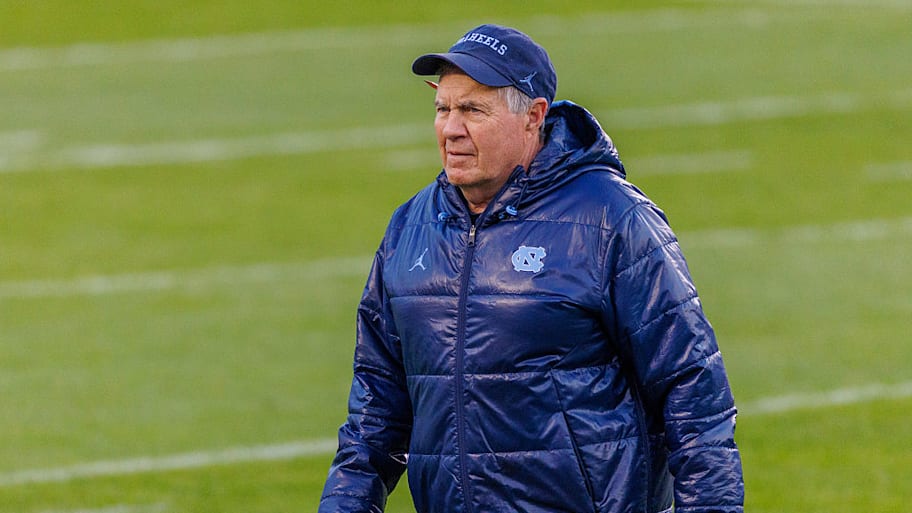Back by popular demand (or force of habit), it’s time for the 2025 Most Intriguing Lists in college football. Let’s start with the 25 Most Intriguing Coaches:
1. Bill Belichick, North Carolina
Forget the girlfriend angle. (The only Jordan that matters in Carolina athletics is a surname with one ‘o,’ not a first name with two.) A six-time Super Bowl champion coach parachuting into the college game for the first time at age 73 is beyond intriguing—it’s completely fascinating, and without precedent. Bill Walsh was a college head coach before he was a Super Bowl winner who went back to college. With major roster turnover from a 6–7 team, nobody knows how well this will work in Year 1. But if Belichick can do the recruiting work, relate to a younger team that he’s accustomed to, tolerate the learning curve of collegians and maintain interest in the job, he’ll win at a significant level within two seasons. Last year‘s ranking: N/A.
2. Deion Sanders, Colorado
Coach Prime is working without his two standout sons, his two-way Heisman Trophy superstar and his bladder. That was removed this summer to rid Sanders of cancer, creating significant complications for his third season with the Buffaloes. (“If you see a port-a-potty on the sideline, it’s real,” he said upon announcing his surgery.) Cynics who questioned whether Sanders would still want to coach Colorado after the departure of Shedeur and Shilo Sanders and No. 2 NFL draft pick Travis Hunter have their answer—he’s willing to go through a lot to do the job. Will this team be good enough to sustain the five-win improvement from 2023 to ‘24? That’s a big ask. Last year‘s ranking: No. 5.
3. Steve Sarkisian, Texas
It seems like a stretch to say this is the most-anticipated season in school history, but the Lone Star State is big on hyperbole so let’s go with it. This much is true: The Longhorns are preseason No. 1 for the first time ever (weird, I know), and they have a Manning as their starting quarterback. Those are, without question, intriguing building blocks. They also have a fantastic defense and impressive collection of skill players. So now it’s up to Sark to finish the program rebuild. After consecutive College Football Playoff berths, can he win a national title and stand next to Darrell Royal and Mack Brown in Texas lore? Last year‘s ranking: No. 15.
4. James Franklin, Penn State
Franklin and the Nittany Lions have copied the playbook that produced the last two national champions, both from the Big Ten. He retained a considerable core of NFL-level talent for a final roundup and improved the coaching staff. Is that enough to get James over the Big Game hump? He’s won enough (101–42 at Penn State, a 70.6% clip) that focus tends to shift to what he hasn’t done, which has become more glaring as the years go by. Franklin’s 1–10 record against Ohio State—and 4–20 mark against top-10 teams overall—loom over this promising season. It’s time to take the next step. Last year‘s ranking: No. 14.
5. Mike Norvell, Florida State
How does a coach rebound from the worst year-over-year plummet in power-conference history? We’re about to find out. From a 13–1 season in 2023 to a 2–10 smoking crater in ’24, Norvell went from being a potential successor to Nick Saban at Alabama to a guy who could be coaching for his job this fall. Given the power play the Seminoles pulled on the rest of the ACC, there is an imperative to back it up. Norvell needs his new transfer quarterback (Thomas Castellanos from Boston College) to be better than his last transfer quarterback (D.J. Uiagalelei). He swept out both coordinators and replaced them with two guys who have a history of dialing it up in Gus Malzahn (OC) and Tony White (DC). Last year‘s ranking: Not ranked.
6. Dabo Swinney, Clemson
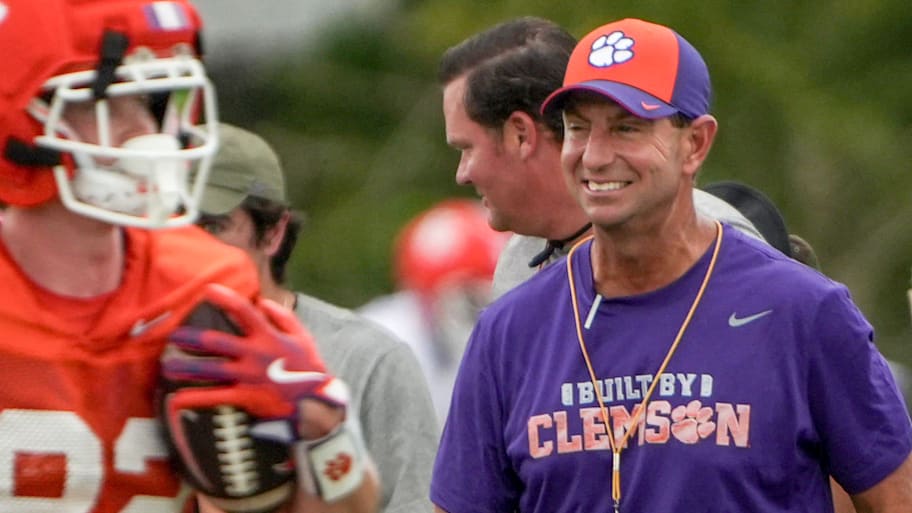
A lot of people think this season will be Dabo’s return to power after four straight seasons outside of serious national championship contention. I’m not so sure about that, but he does have a talented roster of veteran players on both sides of the ball. A man who stubbornly has adhered to an old-school way of doing business has crept into modernity, adding a couple of transfers and showing a greater willingness to make staff changes. Defensive coordinator Tom Allen arrives from Penn State to join third-year offensive coordinator Garrett Riley, whose unit made strides last season. “I think we’re going to be the first 16–0 team,” Swinney told ESPN recently. He didn’t say it would happen this year, but that underscores the confidence he still has in his abilities and his program. Last year‘s ranking: No. 12.
7. Marcus Freeman, Notre Dame
The Fighting Irish’s run to the championship game, plowing through Indiana, Georgia and Penn State and overcoming injuries along the way, established Freeman’s credentials as an elite coach. Those were in question as recently as last September, when Notre Dame inexplicably lost at home to Northern Illinois, but everything that followed canceled out the doubts. His ability to navigate through that and previous crises has never wavered. Freeman’s fourth team has high-level players all over the roster, but will be relying on the most inexperienced quarterback he’s had yet. After tapping the portal for seasoned starters in 2023 and ’24, the leading man for the job is C.J. Carr, who has not thrown a collegiate pass. Last year‘s ranking: No. 11.
8. Curt Cignetti, Indiana
The Hoosiers were the revelation of 2024, and their coach might have had the best ratio of backed-up bravado by anyone in sports since Muhammad Ali. (“I win. Google me.”) Cignetti came swaggering into a Big Ten doormat program from James Madison, brought a bunch of his underrecruited players with him and shocked the nation, going 11–2 overall and 8–1 in conference play. Armed with another quality transfer quarterback (Fernando Mendoza from California) and another relatively lenient schedule (including three nonconference cadavers) don’t be shocked if the Hoosiers are in playoff contention again. I Googled him: He’s 63–11 in his last six seasons. Last year‘s ranking: Not ranked.
9. Kenny Dillingham, Arizona State
If there was a better coaching job than Cignetti at Indiana, it might have been Dillingham at ASU. Picked last in the Big 12, the Sun Devils went 11–3, won the league and pushed heavily favored Texas to the brink in the CFP quarterfinals. At age 35, Dillingham could be the fastest riser in the industry—if he has another big season in Year 3 as a head coach, rest assured that other programs will inquire about prying him away from his alma mater. And this could indeed be another big season, with a star pass-catch combination and a veteran defense leading the way. Replacing the massive production of battering ram Cam Skattebo will be the challenge. Last year’s ranking: Not ranked.
10. Kalen DeBoer, Alabama
In a place where 9–4 is a disappointment, DeBoer has work to do in Year 2. Replacing the irreplaceable Nick Saban was never going to be easy, and then it got harder when veteran QB Jalen Milroe regressed. But DeBoer is a proven winner over time at multiple stops, and he’s reunited with his Washington offensive coordinator, Ryan Grubb. With what is probably the best offensive line in the country leading the way, the Crimson Tide are poised to make significant strides back toward the top of the national heap this season. And if they don’t? We’ll see what the tolerance level is at a school where the last consecutive seasons of single-digit victories came in 2006–07. Last year’s ranking: No. 1.
11. Rich Rodriguez, West Virginia
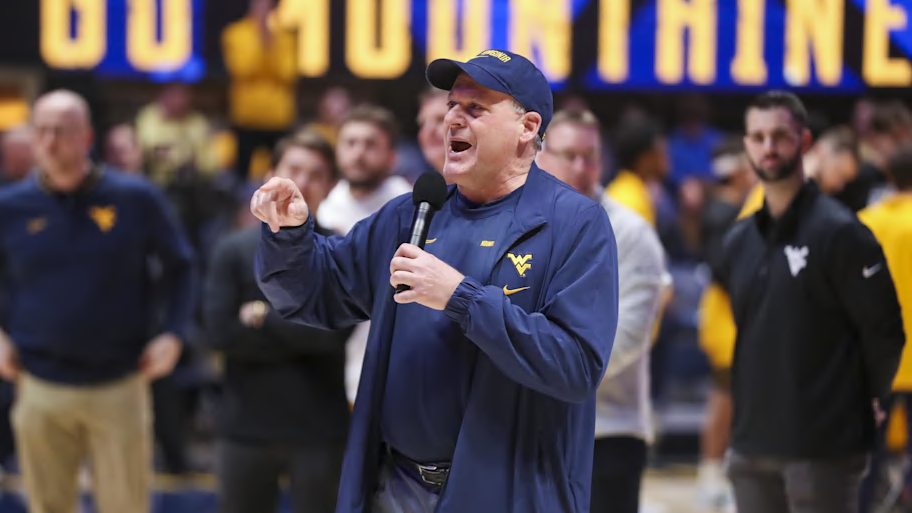
Look who the country roads brought back home. Eighteen years after a fateful decision to leave the Mountaineers after taking them to the brink of the national championship game, RichRod is back. It’s a nostalgia hire, but one with modern production behind it: He went 27–10 at Jacksonville State and 43–35 at Arizona, two places where winning isn’t automatic. Rodriguez has proven that he was more than just a cutting-edge spread offense guy; he can win in a variety of ways with a variety of programs. Now all he has to do is elevate a program that has defined mediocrity as a member of the Big 12, going 58–58 in league play. Last year’s ranking: Not ranked.
12. Sherrone Moore, Michigan
Was a 3–0 finish that included a stunning upset of Ohio State and a bowl victory over Alabama the start of Moore’s validation drive as the worthy successor to Jim Harbaugh? We’ll find out this season. The Michigan passing game—particularly its quarterback play—was nothing short of pathetic last year, ranking 127th nationally in efficiency. New coordinator Chip Lindsey was brought in to fix that, but major improvement might depend on whether No. 1 2025 recruit Bryce Underwood is ready to start right away. Going 2–0 against Ohio State (the first as a fill-in for the suspended Harbaugh in 2023) should be enough to earn Moore some time at a school that hasn’t had a head coach for fewer than three seasons since 1927–28. But Harbaugh reset expectations to a playoff level in his final years. Last year’s ranking: No. 3.
13. Brent Venables, Oklahoma
The Sooners did what college programs love to do, giving a coach a lavish raise and extension after one good year. That happened in June 2024, after which Venables face-planted in his first SEC season by going 6–7. With a reported buyout in the $35 million range, could Oklahoma afford to fire Venables if he has a third bad season out of four on the job? The school has done everything it can to build a support network around him, spending lavishly on a front office staff and new coordinators and incoming transfers. The Sooners need all the ammo they can get, with six out of the final seven opponents starting the season in the Top 25. Last year’s ranking: No. 8.
14. Ryan Day, Ohio State
He’s arrived on the happier side of intriguing—the side where a coach is trying to replicate national championship success instead of trying to prove he can do it the first time. After a validating blitzkrieg through the playoff, Day lost both coordinators and his starting QB, not to mention a bunch of other really good players. Given that, this would be a double-down of the highest magnitude if he can mount a legitimate repeat bid—with or without beating Michigan, which is still A Thing but far less of one with a ring. Day might have the two best players in college football in receiver Jeremiah Smith and safety Caleb Downs, plus an accompanying cornucopia of talent. His team should be in the mix. Last year’s ranking: No. 2.
15. Jon Sumrall, Tulane
If Belichick hadn’t pulled his out-of-left-field stunner by taking the North Carolina job, Sumrall might be the coach of the Tar Heels today. Instead he’s still at Tulane—for this season at least. Other power-conference schools will be interested in the 43-year-old, who has a 32–9 record in three seasons as a head coach. (There could be a bunch of openings in the SEC, for instance.) The Green Wave looked like they might take a step back offensively after losing star quarterback Darian Mensah to Duke, but landing BYU transfer Jake Retzlaff at the 11th hour this summer should improve their chances of winning the American and potentially earning a CFP bid. Last year’s ranking: Not ranked.
16. Bret Bielema, Illinois
With a No. 12 preseason ranking, this is the most anticipated Illinois season in 35 years. For Bielema, it’s his highest preseason rank since his final year at Wisconsin in 2012. After that season he took a wrong turn to Arkansas, spent three seasons as an NFL assistant and then came back older and wiser to repair the Illini. At age 55, big Bret has reminded everyone of his coaching chops. Now a historically mediocre program has to handle unusual expectations. Never shy with opinions and quips, Bielema has a chance to be this year’s Curt Cignetti in the Big Ten—upsetting the status quo and unafraid to talk about it. Last year’s ranking: Not ranked.
17. Brian Kelly, LSU
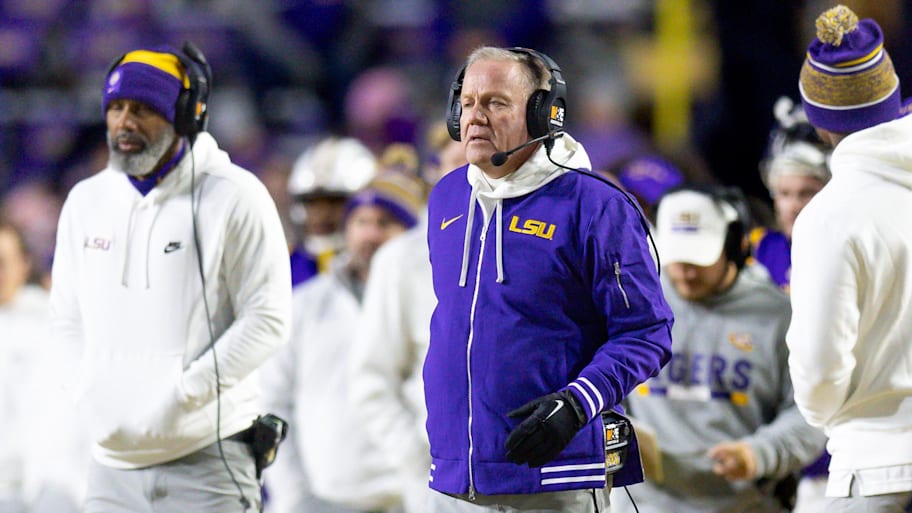
The buzz out of Baton Rouge is that Kelly finally has a defense to go with another explosive offense, which could yield the playoff berth Tigers fans have impatiently anticipated. Reading the room and heeding the urgency after three good-but-not-great years, Kelly pledged to match $1 million in fan donations to LSU’s collective. The program went hard in the transfer portal to shore up some of those defensive deficiencies and fill gaps on an offensive line that had four players drafted. In a 12-team playoff era, season openers don’t matter as much as they used to—but Kelly is 0–3 in such games, and the opener is at Clemson, and let’s just say that BK’s volatility will be challenged by another defeat. Last year’s ranking: Not ranked.
18. Scott Frost, Central Florida
The other Big 12 nostalgia hire (beyond West Virginia) was in Orlando. Frost is back at UCF after flopping at his alma mater, Nebraska. (And taking a shot at the place this summer, telling The Athletic, “I got tugged in a direction to try to help my alma mater and didn’t really want to do it. It wasn’t a good move. I’m lucky to get back to a place where I was a lot happier.”) If the Knights get back the coach who went 13–0 in 2017, and not the guy who went 16–31 with the Cornhuskers, they’re positioned to climb in the fluid Big 12. But this is a bigger lift than rolling through the American eight years ago. Last year’s ranking: N/A.
19. Joey McGuire, Texas Tech
After three years of moderate success in Lubbock, it’s time for the former Texas high school coach to show that he’s a high-level college winner. Red Raiders boosters—most notably former player and current university regent Cody Campbell—gave the program something approaching an open checkbook to plunder the transfer market. Now armed with a roster some believe is the best in the Big 12, it’s McGuire’s job to bring the new parts together into a successful team. Given the investment, an immediate improvement upon McGuire’s .590 winning percentage at Tech seems mandatory. (Don’t underestimate the urgency that is added by watching fellow Texas schools TCU and SMU make the last two playoffs.) Last year’s ranking: Not ranked.
20. Mario Cristobal, Miami
Three times, Cristobal has been on the cusp of a playoff breakthrough—twice at Oregon, and last year with the Hurricanes. And three times, he’s lost late-season games that kept his teams on the outside looking in. A blown 21-point lead against Syracuse in the regular-season finale doomed the Canes last season, perpetuating questions about Cristobal’s in-game coaching. But he’s an adept program builder and recruiter—this offseason he replaced the No. 1 pick in the draft (Cam Ward) with the Georgia starter (Carson Beck), and overhauled the secondary via the portal. The schedule offers a playoff path: four straight at home to start; no games outside the state of Florida until Nov. 1; no Clemson. Last year’s ranking: No. 4.
21. Hugh Freeze, Auburn
Freeze found himself defending his love of golf this summer. He’s often defending himself over something, and this time it was his 11 recorded golf scores in June—a month in which the Tigers were losing committed recruits to rival programs. Combine that with Freeze’s 11–14 record at Auburn—including an 0–2 mark against Alabama—and some fans have decided their coach is not sufficiently minding the store. Freeze came with baggage to a school that has a high tolerance for baggage, as long as there are also victories. It’s time for him to start winning, and the first month will set the tone with road games against Baylor, Oklahoma and Texas A&M. Last year’s ranking: Not ranked.
22. Billy Napier, Florida
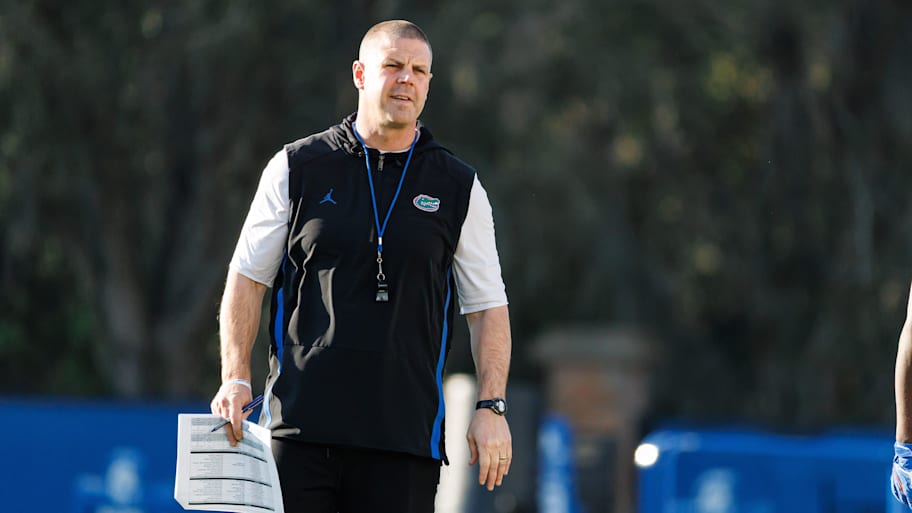
The fact that he’s at this place on the list is good news for Napier—it means he still has a job, and it means the pressure has been at least slightly alleviated after going 8–5 against a murderous schedule. Now the job is to aim higher, with a lot of returning talent and his most experienced Florida team. The bad news is that the schedule is still preposterous, with seven preseason ranked opponents and four in the top 10. With a 7–6 record as Gators coach in the first month of the season, Napier needs to start better this year—which would mean winning at least one of the road games against LSU (Sept. 13) and Miami (Sept. 20). Last year’s ranking: No. 18.
23. Eddie George, Bowling Green
Among the entries on George’s curriculum vitae: Heisman Trophy winner; 10,000-yard NFL rusher; part-time actor on stage and screen; successful FCS head coach; now a first-year FBS head coach. George is back in the state where he first made a name for himself as a star at Ohio State, taking over a Bowling Green program that has been a solid MAC contender of late but has not made the league championship game in a decade. George took Tennessee State to nine wins and an FCS playoff berth last year and now will try to make the HBCU-to-FBS jump like fellow former NFL star Deion Sanders. Last year’s ranking: Not ranked.
24. Luke Fickell, Wisconsin
It’s frankly shocking to see Fickell in a hot-seat situation two seasons after being celebrated by many (myself included) as a home-run hire for the Badgers. But here he is—13–13 overall, on a five-game losing streak and facing a brutal schedule while trying to make a leap forward. A flawed decision to abandon Wisconsin’s ground-and-pound DNA in favor of Phil Longo’s spread, up-tempo offense put Fickell behind the 8-ball. Now they’re hoping for a quick course correction under new OC Jeff Grimes. The Badgers have also overhauled the defensive line via the portal, a necessity facing a schedule full of strong rushing attacks. October could crystallize Fickell’s fortunes, good or bad, with a slate of Michigan on the road, Iowa, Ohio State and Oregon on the road. Last year’s ranking: Not ranked.
25. Michael Vick, Norfolk State
A Hampton Roads regional legend has come back home to start his college coaching career at the local HBCU, part of a wave of former NFL stars looking to follow Deion Sanders up the industry ladder. The hire generated instant buzz, with fellow area legends Allen Iverson and Bruce Smith attending his introductory news conference. Vick might be shortcutting the customary career path through the assistant ranks, but he’s also taking over a struggling program. The Spartans have one winning season in the last 12, and that was a 6–5 mark in 2021. Last year’s ranking: N/A.
Just missed the list: Matt Rhule, Nebraska; Lincoln Riley, USC; Lane Kiffin, Mississippi; Frank Reich, Stanford; Dan Mullen, UNLV; Eli Drinkwitz, Missouri; Spencer Danielson, Boise State; Sam Pittman, Arkansas; Clark Lea, Vanderbilt; Dan Lanning, Oregon; Jamey Chadwell, Liberty; Brent Key, Georgia Tech; DeSean Jackson, Delaware State; Fran Brown, Syracuse; Kyle Whittingham, Utah.
This article was originally published on www.si.com as The 25 Most Intriguing College Football Coaches for 2025.
